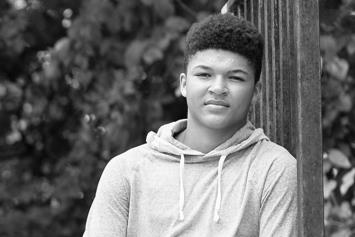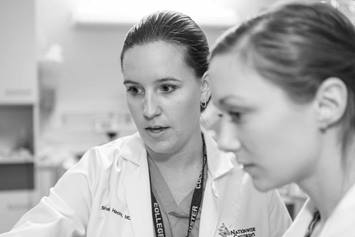Intellectual and Neurodevelopmental Disabilities Post-Doctoral Fellowship
Intellectual and Neurodevelopmental Disabilities Post-Doctoral Fellowship
The Intellectual and Neurodevelopmental Disabilities Postdoctoral Fellowship at Nationwide Children’s Hospital specializes in the assessment and treatment of autism and other neurodevelopmental disabilities.
Intellectual and Neurodevelopmental Disabilities (IND) Postdoctoral fellows work in an interdisciplinary setting focusing on the assessment of children referred for possible autism and other developmental concerns. Training in innovative and evidence-based practice is central to the fellowship program.
Our fellows work with developmental-behavioral pediatricians, neurologists, advanced practice nurses, speech and language pathologists, psychiatrists and genetic counselors. Fellows participate in graduate student and psychology intern training and development, as well as medical education by leading teaching clinics and seminars. Umbrella supervision opportunities include supervision of psychology interns, graduate students, and psychometricians.
The Intellectual and Neurodevelopmental Disabilities (IND) Psychology Postdoctoral Fellowship is a one-year position with the possibility of a second year based on the training needs of the individual and first year performance. We have taken pride in training leaders in our field for nearly 30 years.
The fellowship is a part of Big Lots Behavioral Health Services at Nationwide Children's Hospital, in affiliation with the Department of Pediatrics at The Ohio State University. Fellows receive faculty appointments in The Ohio State University Department of Pediatrics.
Our program is housed within the Child Development Center (CDC) of Nationwide Children's Hospital, located at one of the hospital’s Close To Home Centers in Westerville, Ohio. Various training experiences also occur at the hospital’s Main Campus and other locations around Columbus.
Fellows work five days per week, typically 40-50 hours per week. There is no "on-call" coverage. Individual schedules are developed by the track director, main supervisors and fellows based on training goals and experience level. This allows fellows flexibility in scheduling some appointment types (e.g., feedbacks, individual psych evaluations and treatment appointments). Schedules also incorporate several hours of writing time per week to work on documentation, assessment reports and the postdoctoral project.
Other Psychology Fellowship Tracks at Nationwide Children's Hospital
- Autism Psychology Post-Doctoral Fellowship
- Clinical Child Psychology Post-Doctoral Fellowship
- Neuropsychology Post-Doctoral Fellowship
- Pediatric Acute Treatment (PAT) Psychology Post-Doctoral Fellowship
- Pediatric Psychology Post-Doctoral Fellowship
- Integrated Primary Care (IPC) Post-Doctoral Fellowship
What You Need to Know
Training and Experience
The IND Postdoctoral Fellowship trains in accordance with the scientist-practitioner model. The fellowship is viewed as a process of leadership specialization, whereby fellows are provided with the opportunity to demonstrate increasingly independent practice over the course of the program. Provision of necessary knowledge and skill base is undertaken in the context of modeling, mentoring, teaching and supervision. Training occurs across the following areas of core competence, which are essential to all activities of professional psychologists and are directly related to the quality of psychological services:
- Assessment
- Intervention
- Consultation and Interdisciplinary Relationships
- Scientific Foundations and Research
- Leadership and Advocacy
- Professional Development
The fellowship director will work with each incoming fellow to develop an individualized training program based on the fellow’s training goals and needs, previous experience and level of independence, and the requirements of each training clinic. Therefore individual schedules and rotations will vary.
Assessment
Interdisciplinary Diagnostic Assessments (IDAs)
At the CDC, fellows work as part of an Interdisciplinary Diagnostic Assessment (IDA) team. Team members include a medical provider (e.g., developmental-behavioral pediatricians, pediatric neurologists, psychiatrists or advanced practice nurses), speech therapist, psychometrician, genetic counselor and nurse/medical assistants.
During IDAs, children suspected of autism or developmental delay are evaluated by the full team. Fellows then complete a full psychological assessment to further evaluate the child’s functioning and generate recommendations for services.
Psychological Evaluations
Fellows complete independent psychological evaluations of children with other intellectual and developmental disabilities at the CDC. There are also opportunities to experience other evaluation formats such as targeted assessments for very young children with ASD or transition evaluations for older children with disabilities.
Other Assessment Activities
Assessment activities also occur within several hospital-based, medical sub-specialty clinics as well as an ICF/IID (intermediate care facility for individuals with intellectual disabilities). Typical responsibilities in these clinics include brief psychological testing and/or behavioral consultation. Current clinics with IND Fellowship involvement are:
- Heinzerling Foundation (ICF/IDD facility) – Fellows complete cognitive and adaptive evaluations for residents in a residential facility for children and adults with severe and profound intellectual disability.
- Neurodevelopmental Clinic (Department of Neurology) – Fellows work with an interdisciplinary team (neurologist, psychologist, SLP, occupational therapist and physical therapist) to evaluate children with concerns for developmental delays or ASD, other neurological conditions, and genetic disorders.
- Non-Accidental Traumatic Brain Injury Clinic (NATBI; Department of Developmental/Behavioral Pediatrics) – Fellows work with a child abuse pediatrician, a developmental-behavioral pediatrician, a physical medicine pediatrician and a psychologist to monitor young children who were victims of abusive head trauma.
- Fellows Clinic (Department of Developmental/Behavioral Pediatrics) – CDC fellows work with a developmental-behavioral pediatrics fellow to evaluate young children under age 6 with global concerns in development.
- International Adoption Clinic – Fellows conduct interviews and developmental testing for children who have been internationally adopted as part of a multidisciplinary team and provide consultation to parents regarding behavioral difficulties or social/emotional adjustment to adoption.
- Inpatient Consultation and Liaison Service – Fellows will work with Psychology faculty to provide brief assessment and consultation throughout the broader hospital as needed and on our psychiatric inpatient unit, which recently opened a unit specializing in children with a comorbid developmental disability.
Treatment
Training opportunities focused on behavioral therapy for children with neurodevelopmental disabilities are an integral part of training. Applied Behavior Analytic (ABA) approaches are most commonly used, along with modified cognitive behavioral approaches for anxiety and depression. Treatment cases may also include parent training, particularly the RUBI model and Parent Child Interaction Therapy (PCIT). Treatment experiences will cover a wide range of presenting problems, including diagnoses such as Intellectual Disability, Autism Spectrum Disorder, Fetal Alcohol Spectrum Disorders, Down Syndrome, Anxiety Disorders, Depression, and Attention-Deficit/Hyperactivity Disorder. Commonly seen treatment referrals are those typical to children with intellectual and neurodevelopmental disabilities, including feeding problems, noncompliance, tantrums and aggression, self-injury, sleep problems, toileting delays, and other gastrointestinal issues. There may be complicating family/psychosocial issues to address. Treatment cases may also involve habilitative interventions for adaptive behavior, language development, school and academic interventions, and early intensive behavioral intervention for autism or other developmental disorders.
Fellows typically provide outpatient treatment services throughout the year, typically with a caseload of 3-4 patients at a time. Additionally, some Fellows will participate in the program’s outpatient feeding treatment services, which includes an intensive model (child and family attend three feeding appointments per week for three to four weeks).
Treatment services are also interdisciplinary, emphasizing collaboration with physicians on medical management, clinical social workers on family therapy, and possibly Board Certified Behavior Analysts on behavioral interventions.
Advocacy
IND Fellows take part in advocacy activities during the fellowship. Past opportunities have included
- Participating as speakers for the CDC’s various Project ECHO programs
- School observation visits
- Assistance with IEP planning
- Interaction with legislators
- Developing presentations for community organizations or schools.
Professional Development Project and Research
Fellows will complete a research or program development project over the course of their fellowship.
Goal of this project: To give Fellows valuable experience in taking a leadership role in developing and carrying out a project to improve practice or increase knowledge in the area of neurodevelopmental disabilities.
- Project will increase the Fellow’s competitiveness for future employment in their chosen job setting.
- Project will be developed and carried out under the guidance of the postdoctoral co-directors, taking into account Fellow’s interests and career goals.
- At the culmination of this project, Fellows will prepare a presentation to share with CDC faculty that can serve as a job talk for future employment opportunities.
To facilitate these projects, Fellows participate in a biweekly research group to discuss study design and review relevant scholarly literature. There are additional opportunities to participate in research projects being run by other psychology faculty based on the Fellow’s interests. Fellows also can attend Autism Treatment Network (ATN) Webinars.
Didactics and Continued Learning
Various educational opportunities occur throughout the week at the CDC, these include:
- Each week, fellows attend Group Supervision with faculty and other trainees, including discussion of treatment and assessment cases, presentation of empirically-based treatment programs, and an opportunity to discuss the application of treatments to specific cases.
- Clinical Case Problem Conference (also known as “Stump the Chump”) is a monthly case conference that requires trainees to present one assessment case to other trainees and CDC faculty. This is an opportunity to receive feedback about assessment procedures, interpretation of results, and ideas for recommendations.
- Cutting Edge Seminar. Occurs periodically and involves Guest speakers from the community, various medical departments at Nationwide Children’s Hospital, or professionals at The Ohio State University share their research on topics relevant to IND concerns.
- Diagnostic Intake (DI) Rounds also occurs monthly and is led by CDC’s social work/family therapy team to problem-solve concerns that arise during CDC intake appointments.
Supervision
The CDC follows a developmental model for supervision, working with trainees to identify strengths and areas of potential growth in various competency areas and then tailoring support to facilitate skill acquisition and growth of confidence in ability to practice independently.
Fellows will be assigned a primary supervisor responsible for providing supervision for psychological evaluations and therapy cases. Over the course of the training program, all fellows also receive supervision from a number of different faculty members in subspecialty clinics and for their interdisciplinary diagnostic assessments. Supervision includes both individual and group modalities.
Fellows will also be assigned a preceptor, who they will meet with at least monthly to discuss professional development issues both within the fellowship activities and in the context of preparing for the fellow’s future career.
Salary & Benefits
IND fellows receive a salary of $65,344 for the first year, which will increase to $67,304 if fellows stay for a second year, as well as the Nationwide Children's Hospital employee benefit package, which includes health, dental and vision insurance, in addition to professional liability coverage.
The IND Fellowship also allows for an enhanced stipend for professional development ($1,500 per year), as well as up to $1,500 for one EPPP exam, study materials and Ohio Psychology license fee. Incoming fellows are entitled to a taxable moving expense of up to $3,000. Fellows do not “accrue” paid time off (PTO) given the time limited nature of their Nationwide Children’s employment. Instead, fellows are provided with a yearly bank of:
- 15 days of paid vacation per year.
- 6 days of paid holidays for: New Years Day, Memorial Day, Independence Day, Labor Day, Thanksgiving Day, and Christmas Day. These days are not part of the 15 vacation days.
- Up to 5 days of paid professional leave. These days are intended to support fellows for professional development related activities, such as conference attendance.
- Up to 6 days of paid sick time: These days are meant for both planned and unplanned medically related absences.
About Nationwide Children's
Nationwide Children's Hospital is a U.S. News and World Report Honor Roll hospital and provides the majority of pediatric medical and behavioral health care services in central and southeastern Ohio, serving a population of more than 3 million. The catchment area includes West Virginia and Kentucky.
It is located in Columbus, the state capital, which is a rapidly growing, diverse metropolitan area with a population of more than 1.9 million. There is a large Somali population in Columbus as well as a growing Hispanic population. For more information about Columbus, Ohio, visit Experience Columbus.
The Child Development Center is an established interdisciplinary program designed to serve the needs of children with intellectual and developmental disabilities, including Autism Spectrum Disorders.
Our program is designated as a site in the Autism Speaks Autism Treatment Network (ATN) and the Autism Intervention Research Network on Physical Health (AIR-P). The CDC is one of the most comprehensive and largest neurodevelopmental psychology departments in the country and is part of one of the largest Pediatric Behavioral Health units. The program is also housed within the same building as the hospital’s Center for Autism Spectrum Disorders, which focuses on the intervention needs of children and families diagnosed with autism spectrum disorders.
Application & Selection
Applicants from behavioral, clinical, counseling and school psychology programs are invited to apply. We aim to provide trainees from broad backgrounds with both the general and specialty-oriented knowledge and skills needed for specialization in the field of IND psychology.
Applicant Requirements:
- Applicants should have experience in clinical child/pediatric psychology
- Interest in working in an interdisciplinary setting, focusing on the assessment and diagnosis of, as well as providing behavioral treatments for, children referred for possible autism spectrum disorders or other developmental delays and disabilities
- Possess a doctorate in psychology and have training in the scientist-practitioner model
There are three IND Postdoctoral Fellowship positions at the CDC. The fellowship is a one-year position with the option of a second year. Because the fellowship in Intellectual and Neurodevelopmental Disabilities offers the option of a second year, availability of open positions can vary. Interested candidates are encouraged to inquire about the availability of open positions for the upcoming training year before formally applying.
Interested candidates should email a cover letter stating career and training goals and their curriculum vitae to the email address listed below. Please also submit two letters of recommendation sent via direct email from letter writers or through standard mail. The application is also available online.
Charles Albright, PhD
Charles.Albright@NationwideChildrens.org
(614) 355-7500
Background Check and Drug Screen
Our patients’ health and safety is in our hands. Upon hire, all new employees at Nationwide Children’s must complete and pass a background check and drug screen. The background check will include reference checking and a criminal background search complete with finger printing. Nationwide Children's follows the Ohio Revised Code to determine whether a felony or misdemeanor conviction or guilty plea is a disqualifying offense for applicants to the Internship in Professional Psychology. For applicants to the Internship in Professional Psychology, Nationwide Children's primarily relies on the background check requirements found in Ohio Revised Code Sections 3701.881, 2151.86, and 109.572 and Ohio Administrative Code Section 5101:2-5-09.
All job candidates are required to successfully complete a drug screen as a condition of employment. Nationwide Children's is a drug-free workplace, and our 9-panel drug screen tests for:
- Amphetamine/Methamphetamine
- Barbiturates
- Benzodiazepines
- Cannabinoids (including medicinal marijuana)
- Cocaine
- Methadone
- Oxycodone
- Opiates
Contact
For more information regarding the fellowship, please contact:
Charles Albright, PhD
Track Director
Charles.Albright@NationwideChildrens.org
(614) 355-7500
Community and Representation at Nationwide Children's Hospital
At Nationwide Children’s, we believe our strength lies in reflecting the full range of experiences, backgrounds, and perspectives of the children and families we serve. We are committed to building a culture where every person not only belongs—but also has the opportunity to thrive.
We value the wide range of experiences and viewpoints that people bring, recognizing that our differences strengthen the care and compassion we provide together. Our commitment to representation includes welcoming people whose paths, perspectives, and experiences reflect the rich complexity of the communities we serve.
Across our hospital and fellowship program, you’ll see this commitment in action:
- Our Office for Health Equity drives initiatives, directly supported by our Chief Executive Officer and other senior leaders, that promote a cross-organizational effort for institutional change.
- Employee Resource Groups (ERGs) bring together staff with shared experiences, interests, or goals to serve as a resource and voice for the organization and to help us better serve our families and communities.
- Within Behavioral Health, there are faculty-driven efforts through the Reflective Practice Committee and the Committee for Social Change to engage staff in shaping welcoming communities and promoting professionally focused advocacy activities.
- Our fellowship program includes representation-focused advisory committees and encourages fellow engagement in decision-making, culture building, and training design.
- Our training program’s Associate Director of Clinical Practice and Development leads and develops programs for recruiting, supporting, and retaining trainees and psychologists from a wide variety of backgrounds, and designs seminars and curriculum that enhance our commitment to providing the best care to achieve the best outcomes for all children.
- We welcome international students and have a strong track record of successful international fellows.
We believe that when all members of our team feel that they belong and bring their full selves to work, we are better equipped to deliver world-class care, innovate, and respond to the needs of every family we serve.



